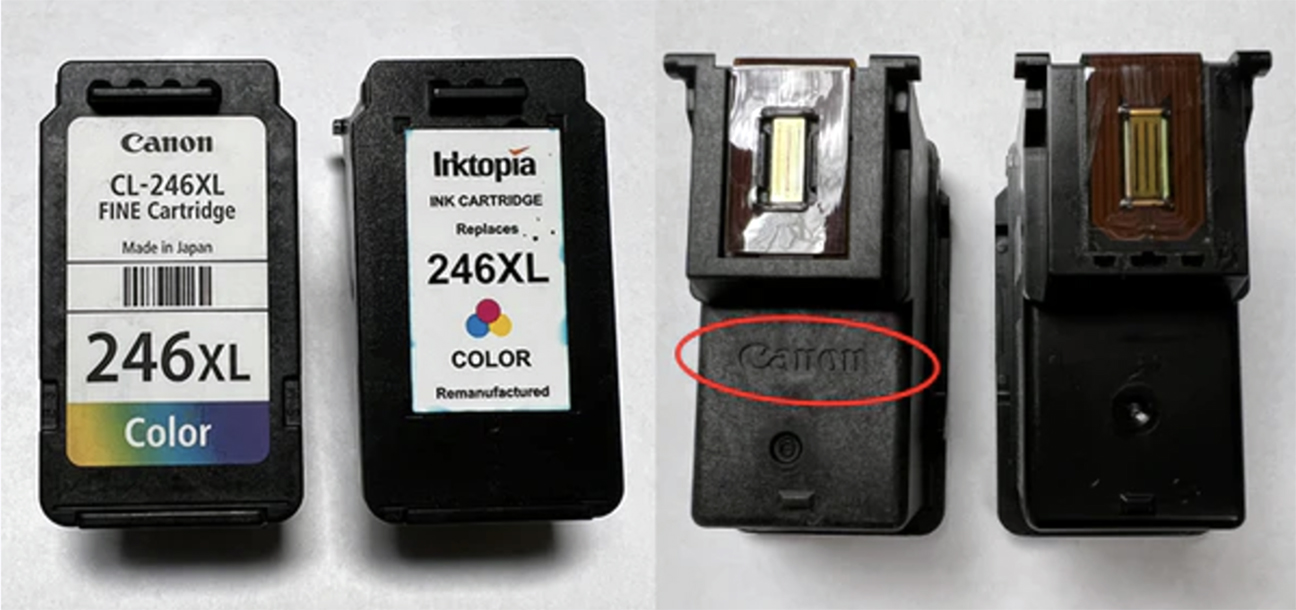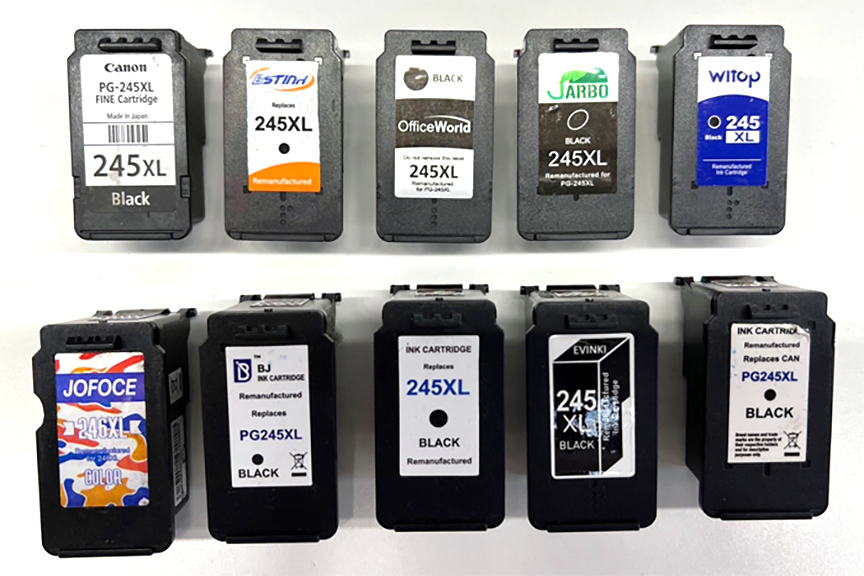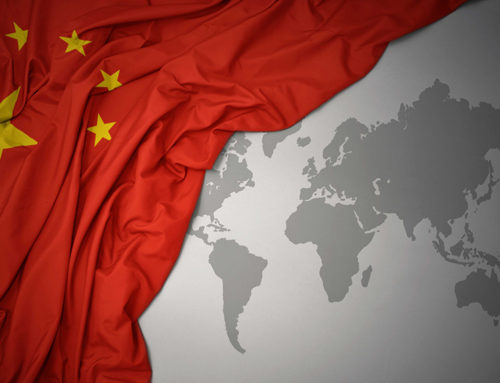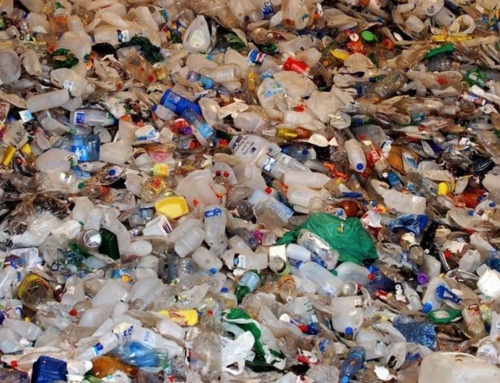In recent discussions, President-elect Donald Trump has suggested revisiting Section 230 of the Communications Decency Act to address concerns around free speech. But there’s another facet to this law: the broad protection it affords e-commerce platforms like Amazon in cases of misleading, counterfeit goods, and questionable product claims that impact millions of consumers. One specific example highlights the issue sharply: the influx of misleading third-party ink cartridges on Amazon that infringe upon OEM (Original Equipment Manufacturer) patents, bypass proper recycling protocols, and drive waste directly into landfills. Revisions to Section 230 could mark a turning point in holding e-commerce giants accountable for product integrity, which is essential for consumer protection, corporate transparency, and environmental sustainability.
The Problem of Counterfeit Ink Cartridges on Amazon
Amazon has long been criticized for the counterfeit goods that flood its third-party marketplace. While counterfeit listings for luxury items like handbags and shoes often make headlines, counterfeit ink cartridges—branded as remanufactured but often newly made with questionable quality—present an equally pressing problem. They frequently mimic brand-name packaging from OEM companies like HP, Canon, Epson, and Brother, misleading consumers into buying third-party products under the false impression that they are supporting original manufacturers.
The printer ink and toner industry is notoriously known for its “razor-and-blade” business model, where manufacturers sell printers at lower prices but charge a premium for replacement cartridges. This dynamic has opened a door for independent third-party sellers who market themselves as affordable alternatives. However, many of these alternatives are made overseas, mainly in China, with materials and processes that infringe upon OEM patents and result in lower-quality products. Yet, due to a loophole under Section 230, Amazon bears no liability for the sale of counterfeit or misleading product listings, leaving consumers vulnerable.
The Environmental Impact of Knockoff Cartridges
The environmental cost is alarming. These counterfeit ink cartridges are often marketed as remanufactured, implying that they’re made from reused parts or are theoretically recyclable. However, many of these products are newly manufactured, meaning they are intended for single use and do not meet remanufacturing standards. Once used, they are disposed of as non-recyclable waste, contributing to the already massive problem of plastic waste. Genuine remanufactured cartridges, by contrast, go through a process that involves refurbishing used cartridges, which allows for multiple cycles of use and, ultimately, less waste.
Consumers seeking sustainable purchasing options are often duped by Amazon’s listings, which rank these counterfeit products prominently. These knockoffs regularly appear higher than OEM products in search results, fueled by paid advertisements that benefit Amazon’s wallet. Consequently, consumers who seek reliable, environmentally friendly, and quality products often unknowingly end up purchasing inferior items that contribute directly to landfill waste, undermining their attempts to make eco-friendly choices.

Amazon’s Counterfeit Problem and Section 230
Amazon is legally shielded under Section 230, which offers broad immunity to platforms for content posted by third-party sellers, including product listings. Despite its “Counterfeit Crimes Unit,” Amazon faces difficulties monitoring and controlling the counterfeit goods that permeate its marketplace. According to industry experts and recent findings, Amazon continues to host listings from numerous third-party sellers with counterfeit ink cartridges designed to mimic OEM products’ visual branding. Although Amazon has been noted to have collaborated with major brands like Canon to combat this issue, the measures often fall short due to the overwhelming volume of listings and the financial incentives Amazon derives from these third-party sales and advertisements.
Project Zero, Amazon’s program that allows brands to remove infringing products directly, is an attempt to address counterfeits. However, this program shifts the burden of enforcement to the very brands affected by counterfeit listings, rather than Amazon assuming full responsibility. OEMs like HP have taken third-party sellers to court to protect their packaging designs, as in the case against Ejet, a Chinese company accused of infringing HP’s “trade dress.” However, the number of counterfeit sellers is so vast that a single court case cannot sufficiently stem the influx of misleading ink cartridges, leaving consumers at risk.
How Section 230 Reform Could Change the Landscape
President-elect Trump’s plan to modify Section 230 could force platforms like Amazon to assume greater accountability for the products sold on their sites. Specifically, changes could make Amazon liable for counterfeit listings that mislead consumers, requiring the company to verify product authenticity and ensure transparent labeling before allowing products to go live.
A reformed Section 230 could set standards for product listings, obliging sellers to validate claims about a product’s origin, manufacturing status, and environmental impact. This change could prevent sellers from labeling newly made products as remanufactured, thereby protecting both consumers and the OEMs whose products are often infringed upon.
Moreover, introducing requirements for sustainable packaging and genuine remanufacturing processes could lead to fewer single-use products entering the market, alleviating some of the strain on landfills. An additional benefit would be the support of American recycling initiatives by reducing the entry of counterfeit goods that circumvent recycling protocols.
Finding a Balance Between Competition and Consumer Protection
While some argue that blocking third-party sales would strengthen OEM monopolies, the current landscape is already heavily anti-competitive. Counterfeit products aren’t offering genuine competition; instead, they mislead consumers into believing they’re purchasing reliable alternatives. Reforming legislation to require transparency in product listings and holding platforms accountable for listing accuracy would allow legitimate third-party sellers to compete fairly on quality and price.
The situation is eroding the American business model. Section 230 was intended to address accountability, yet many platforms exploit this law to evade responsibility. When distributing products in the United States, platforms should be held to U.S. standards, and if they fail to comply, they should face consequences.
Like a traditional distributor, platforms like Amazon should bear responsibility if there’s an issue with a product. However, the lack of checks and balances on product safety has effectively dismantled the traditional distributor chain, leaving consumers unprotected and US businesses to suffer against a rising number of low cost, low quality manufacturers overseas that undercut US sellers and manufacturers with sub-par products that elevate the issues of plastic waste.
There is precedent for this in other industries. Brands that advertise a product as organic, for example, must meet strict regulatory guidelines to use that label. Similarly, third-party sellers advertising “remanufactured” ink cartridges should be required to substantiate their claims, protecting consumers from misleading information and giving environmentally conscious buyers confidence in their choices.
The issue of counterfeit ink cartridges on Amazon reveals the complexities surrounding Section 230 and the challenges of balancing corporate accountability with consumer protection. As the marketplace evolves, so must the laws that govern it. President Trump can propose revisions to Section 230 that would address the misrepresentation that plagues e-commerce platforms and to bring Amazon’s counterfeit problems under control, particularly for environmentally damaging products like counterfeit ink cartridges.
Revised legislation could place a renewed emphasis on product integrity, sustainability, and transparency, protecting consumers from deceptive marketing practices. This change is not only a necessary step for the e-commerce industry but also a significant move toward a more sustainable, transparent economy—one in which consumers can make informed, responsible choices without wading through a sea of counterfeits and misleading information.






